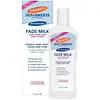What's inside
What's inside
 Key Ingredients
Key Ingredients

 Benefits
Benefits

 Concerns
Concerns

 Ingredients Side-by-side
Ingredients Side-by-side

Water
Skin ConditioningGlycerin
HumectantNiacinamide
SmoothingParaffinum Liquidum
EmollientCetearyl Alcohol
EmollientIsopropyl Myristate
EmollientEthylhexyl Dimethyl Paba
UV AbsorberStearyl Alcohol
EmollientDimethicone
EmollientGlyceryl Stearate
EmollientPEG-100 Stearate
Ceteareth-20
CleansingTocopheryl Acetate
AntioxidantRetinol
Skin ConditioningTricholoma Matsutake Extract
Skin ConditioningAscorbyl Palmitate
AntioxidantGlycyrrhiza Glabra Root Extract
BleachingLeuconostoc/Radish Root Ferment Filtrate
AntimicrobialCitric Acid
BufferingPhenoxyethanol
PreservativeButylene Glycol
HumectantPolysorbate 20
EmulsifyingHydroxypropyl Cyclodextrin
MaskingCaprylic/Capric Triglyceride
MaskingXanthan Gum
EmulsifyingLauryl Glucoside
CleansingEthylhexylglycerin
Skin ConditioningPropylene Glycol
HumectantDisodium EDTA
Parfum
MaskingCitronellol
PerfumingLimonene
PerfumingHydroxycitronellal
PerfumingButylphenyl Methylpropional
PerfumingLinalool
PerfumingHydroxyisohexyl 3-Cyclohexene Carboxaldehyde
MaskingAlpha-Isomethyl Ionone
PerfumingWater, Glycerin, Niacinamide, Paraffinum Liquidum, Cetearyl Alcohol, Isopropyl Myristate, Ethylhexyl Dimethyl Paba, Stearyl Alcohol, Dimethicone, Glyceryl Stearate, PEG-100 Stearate, Ceteareth-20, Tocopheryl Acetate, Retinol, Tricholoma Matsutake Extract, Ascorbyl Palmitate, Glycyrrhiza Glabra Root Extract, Leuconostoc/Radish Root Ferment Filtrate, Citric Acid, Phenoxyethanol, Butylene Glycol, Polysorbate 20, Hydroxypropyl Cyclodextrin, Caprylic/Capric Triglyceride, Xanthan Gum, Lauryl Glucoside, Ethylhexylglycerin, Propylene Glycol, Disodium EDTA, Parfum, Citronellol, Limonene, Hydroxycitronellal, Butylphenyl Methylpropional, Linalool, Hydroxyisohexyl 3-Cyclohexene Carboxaldehyde, Alpha-Isomethyl Ionone
Water
Skin ConditioningAlcohol Denat.
AntimicrobialHamamelis Virginiana Extract
AntiseborrhoeicPEG-40 Hydrogenated Castor Oil
EmulsifyingMelaleuca Alternifolia Leaf Oil
AntioxidantTocopheryl Acetate
AntioxidantSalicylic Acid
MaskingLactic Acid
BufferingSodium C14-16 Olefin Sulfonate
CleansingSodium Hydroxide
BufferingTetrasodium EDTA
Ethylhexylglycerin
Skin ConditioningPhenoxyethanol
PreservativeParfum
MaskingButylphenyl Methylpropional
PerfumingLimonene
PerfumingBenzyl Benzoate
AntimicrobialCI 42090
Cosmetic ColorantCI 14700
Cosmetic ColorantWater, Alcohol Denat., Hamamelis Virginiana Extract, PEG-40 Hydrogenated Castor Oil, Melaleuca Alternifolia Leaf Oil, Tocopheryl Acetate, Salicylic Acid, Lactic Acid, Sodium C14-16 Olefin Sulfonate, Sodium Hydroxide, Tetrasodium EDTA, Ethylhexylglycerin, Phenoxyethanol, Parfum, Butylphenyl Methylpropional, Limonene, Benzyl Benzoate, CI 42090, CI 14700
 Reviews
Reviews

Ingredients Explained
These ingredients are found in both products.
Ingredients higher up in an ingredient list are typically present in a larger amount.
Butylphenyl Methylpropional is a synthetic fragrance. You might know it as "lilial". The scent of this ingredient is floral-like and similar to the scent of lily flowers.
In March of 2022, the EU banned this ingredient in both rinse-off and leave-on products. This is because research found Butylphenyl Methylpropional to disrupt fertility in rats.
This ingredient is also a known EU allergen, meaning it is likely to cause an allergic reaction. Irritated skin can be damaging.
We always recommend speaking with a professional if you have any concerns or questions about this ingredient.
Learn more about Butylphenyl MethylpropionalEthylhexylglycerin (we can't pronounce this either) is commonly used as a preservative and skin softener. It is derived from glyceryl.
You might see Ethylhexylglycerin often paired with other preservatives such as phenoxyethanol. Ethylhexylglycerin has been found to increase the effectiveness of these other preservatives.
Limonene is a fragrance that adds scent and taste to a formulation.
It's found in the peel oil of citrus fruits and other plants such as lavender and eucalyptus. The scent of limonene is generally described as "sweet citrus".
Limonene acts as an antioxidant, meaning it helps neutralize free radicals.
When exposed to air, oxidized limonene may sensitize the skin. Because of this, limonene is often avoided by people with sensitive skin.
The term 'fragrance' is not regulated in many countries. In many cases, it is up to the brand to define this term. For instance, many brands choose to label themselves as "fragrance-free" because they are not using synthetic fragrances. However, their products may still contain ingredients such as essential oils that are considered a fragrance.
Learn more about LimoneneParfum is a catch-all term for an ingredient or more that is used to give a scent to products.
Also called "fragrance", this ingredient can be a blend of hundreds of chemicals or plant oils. This means every product with "fragrance" or "parfum" in the ingredients list is a different mixture.
For instance, Habanolide is a proprietary trade name for a specific aroma chemical. When used as a fragrance ingredient in cosmetics, most aroma chemicals fall under the broad labeling category of “FRAGRANCE” or “PARFUM” according to EU and US regulations.
The term 'parfum' or 'fragrance' is not regulated in many countries. In many cases, it is up to the brand to define this term.
For instance, many brands choose to label themselves as "fragrance-free" because they are not using synthetic fragrances. However, their products may still contain ingredients such as essential oils that are considered a fragrance by INCI standards.
One example is Calendula flower extract. Calendula is an essential oil that still imparts a scent or 'fragrance'.
Depending on the blend, the ingredients in the mixture can cause allergies and sensitivities on the skin. Some ingredients that are known EU allergens include linalool and citronellol.
Parfum can also be used to mask or cover an unpleasant scent.
The bottom line is: not all fragrances/parfum/ingredients are created equally. If you are worried about fragrances, we recommend taking a closer look at an ingredient. And of course, we always recommend speaking with a professional.
Learn more about ParfumPhenoxyethanol is a preservative that has germicide, antimicrobial, and aromatic properties. Studies show that phenoxyethanol can prevent microbial growth. By itself, it has a scent that is similar to that of a rose.
It's often used in formulations along with Caprylyl Glycol to preserve the shelf life of products.
Tocopheryl Acetate is AKA Vitamin E. It is an antioxidant and protects your skin from free radicals. Free radicals damage the skin by breaking down collagen.
One study found using Tocopheryl Acetate with Vitamin C decreased the number of sunburned cells.
Tocopheryl Acetate is commonly found in both skincare and dietary supplements.
Learn more about Tocopheryl AcetateWater. It's the most common cosmetic ingredient of all. You'll usually see it at the top of ingredient lists, meaning that it makes up the largest part of the product.
So why is it so popular? Water most often acts as a solvent - this means that it helps dissolve other ingredients into the formulation.
You'll also recognize water as that liquid we all need to stay alive. If you see this, drink a glass of water. Stay hydrated!
Learn more about Water